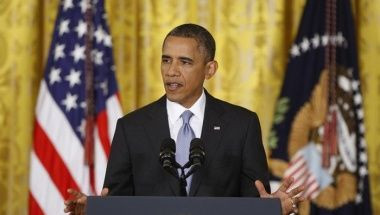Obama Announces The End Of NSA Metadata Collection 'As It Currently Exists'

President Barack Obama announced a series of changes regarding U.S. intelligence operations Friday morning, responding to allegations of potential abuse in the wake of Edward Snowden’s “avalanche of unauthorized disclosures” about the National Security Agency.
In the most-anticipated announcement of the speech, Obama announced that he will end the NSA's telephone metadata collection program “as it currently exists.”
"Effective immediately, we will only pursue phone calls that are two steps removed from a number associated with a terrorist organization instead of three,” Obama said of the changes. He also promised that the federal government will no longer store large amounts of metadata and would instead only have access to such a database when there is a specific national security reason.
As expected, the president did not stick with a recommended plan to entrust all phone call metadata with telecom companies. But Obama did not present a plan of his own, either. Acknowledging that the government could not hold all the data itself without the potential for abuse, Obama called on Attorney General Eric Holder to present a new plan for storing telephone data that would balance privacy and security.
Additionally, Obama announced that the government will continue its “National Security Letters” program requiring third parties to give information on suspects, but that the program will be conducted with more transparency. To ensure this, he has announced the creation of several privacy-related positions in the State Department and in the White House. Intelligence agencies will be subject to annual reviews of their methods and targets as well.
Obama also addressed the outrage from foreign governments concerned about spying in their nations. Somewhat frustrated, Obama said the United States is judged by a different standard, stating that “No one expects China to have an open debate about privacy concerns” and that every nation accusing the United States of overstepping its bounds also has intelligence programs targeting America. Still, Obama assured world leaders that they can expect their privacy.
"Unless there is a compelling national security purpose, we will not monitor the communications of heads of state and government of our close friends and allies,” Obama said.
According to Obama, U.S. intelligence will collect and use foreign data only for the purposes of counterintelligence, counterterrorism, cybersecurity and transnational crime.
Throughout the speech, Obama acknowledged that the nation must remain vigilant against potential threats, but also weigh those concerns with the privacy of its citizens and of its allies’ citizens.
© Copyright IBTimes 2024. All rights reserved.






















